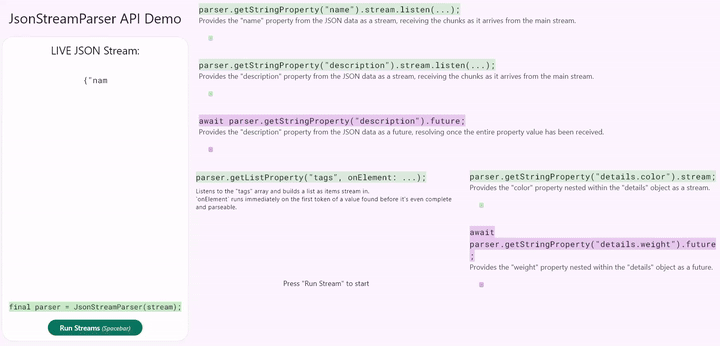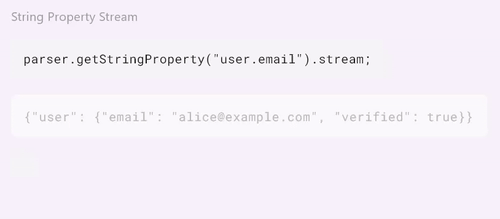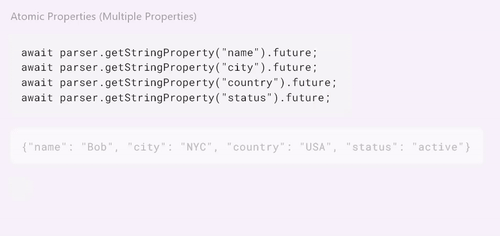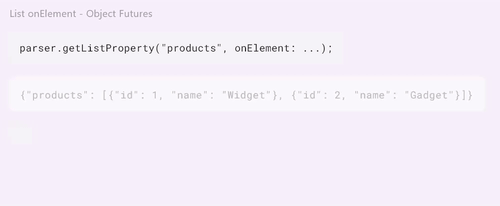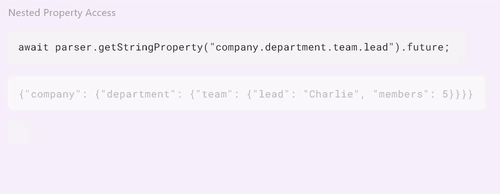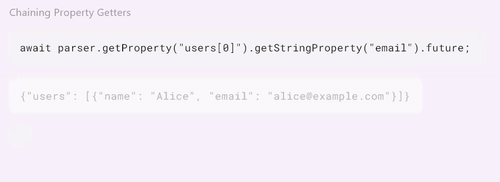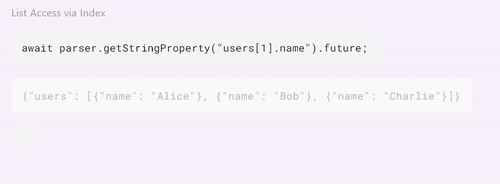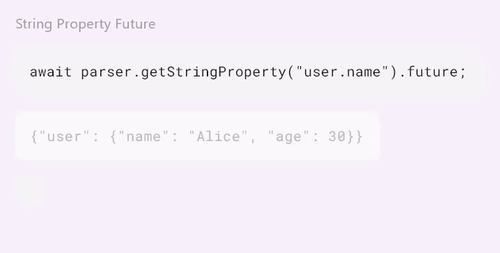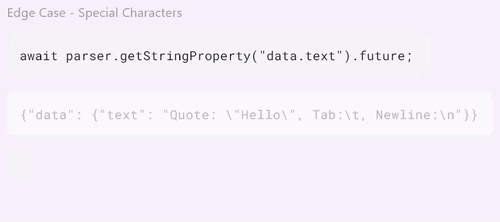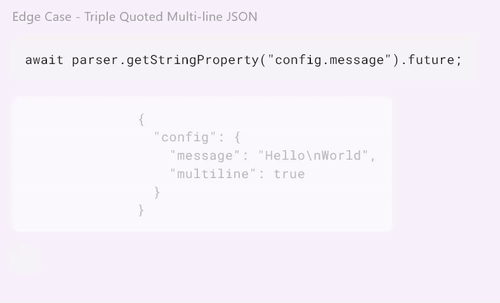A streaming JSON parser for Dart that solves the LLM streaming response problem.
338 tests passing - Core functionality is well-tested and ready for use.
Encountered a bug?
- Please try upgrading to the latest version, as fixes are released frequently.
- If the issue persists, please file an issue with code or instructions on how to reproduce it. Your feedback is invaluable!
Streaming LLM responses in JSON format has a slight problem: An LLM API provides a Stream<String>, but the chunks are partial and incomplete tokens of a larger JSON structure:
- CHUNK 1:
{"title": "My G - CHUNK 2:
reat Blog Po - CHUNK 3:
st", "items": [ - CHUNK 4:
{"id": 1, "n - CHUNK 5:
ame": "Item 1"} - CHUNK 6:
]}
These cannot be easily parsed with standard JSON parsers. Developers are typically forced into two suboptimal solutions:
- Full Buffering (Slow): Wait for the entire stream to finish and then call
jsonDecode(). This is slow, creates high latency, and completely wastes the benefits of streaming. - Raw Output (Broken): Append raw chunks directly to a UI. This displays un-parsable, broken text (like
{"title": "My G) and is not a valid way to handle structured data. - Specialized Parsers (Complex): Write a specialized streaming parser from scratch. This is complex, error-prone, and time-consuming.
This JSON Stream Parser is designed to solve this exact problem.
This parser functions as a reactive, character-by-character JSON state machine with a clean, high-level API. It parses the stream token-by-token, allowing an application to react to JSON data as it is being formed.
Visit the live demo at: https://comsindeed.github.io/json_stream_parser_demo/
import 'package:llm_json_stream/json_stream_parser.dart';
void main() async {
final llmStream = getLLMStream(); // Returns Stream<String>
final parser = JsonStreamParser(llmStream);
// Subscribe to specific properties
final titleStream = parser.getStringProperty("title");
final itemsStream = parser.getListProperty("items");
// React to values as they complete
titleStream.stream.listen((chunk) {
print("Title chunk: $chunk");
});
// Await full values when needed
final items = await itemsStream.future;
print("Full items list received: $items");
}The most significant feature is the ability to stream the value of a JSON string property, chunk by chunk.
A traditional parser waits until it has parsed a complete string value (e.g., "My Great Blog Post") before returning it. This parser, via its StringPropertyStream, provides a .stream that emits chunks of the string's content as they are parsed from the input.
// Subscribe to the 'title' property
final titleStream = parser.getStringProperty("title");
// Listen to its .stream
titleStream.stream.listen((chunk) {
// This listener fires multiple times as chunks arrive:
// 1. Fires with: "My G"
// 2. Fires with: "reat Blog Po"
// 3. Fires with: "st"
// This allows a UI widget to update token-by-token
myTextWidget.text += chunk;
});This enables a UI to display text values as if the AI is typing them directly into the designated field.
This parser changes how JSON arrays are handled. Instead of parsing a complete object and then adding it to a list, the onElement callback fires immediately when a new list item is first discovered.
When the parser, while processing an array, encounters the first character of a new element (e.g., an opening { or "), it fires the onElement callback before that element is parsed.
// Subscribe to the 'items' list
final itemsList = parser.getListProperty("items");
// "Arm the trap"
itemsList.onElement((propertyStream, index) {
// This fires the MOMENT the LLM starts a new item.
// It does not wait for the item to be finished.
// 'propertyStream' is a new PropertyStream (like a MapPropertyStream)
// for this new item that doesn't even fully exist yet.
// A UI can add a new card to a list *immediately*
final newCard = MyReactiveCardWidget();
myListView.add(newCard);
// The new card can then be given the streams it needs to
// populate *itself* as its data arrives.
if (propertyStream is MapPropertyStream) {
newCard.listenToTitle(propertyStream.getStringProperty("name").stream);
newCard.listenToId(propertyStream.getNumberProperty("id").future);
}
});This allows for building UIs that can add new elements instantly and then "fill them in" reactively, creating a highly responsive feel.
The parser's API provides flexibility by offering both a Future and a Stream for its properties, allowing the developer to choose the correct tool for the job.
.stream: Used for properties (like strings) where receiving partial chunks, token-by-token, is desired..future: Used for atomic properties (likenum,bool, ornull) where the complete value is needed. ThisFuturecompletes as soon as that specific property is fully parsed, even if the rest of the JSON stream is still arriving.
// For an item {"id": 1245, "name": "Item 1"} being parsed by an onElement callback:
if (propertyStream is MapPropertyStream) {
// 1. Use the .future for the ID.
// This completes as soon as the '1245' is parsed.
final id = await propertyStream.getNumberProperty("id").future;
print('Got the ID: $id. Fetching more data...');
// 2. Use the .stream for the name.
// This streams "Item" then " 1" as chunks arrive.
// Useful for updating a UI widget.
element.getStringProperty("name").stream.listen((chunk) {
myCardWidget.title += chunk;
});
}This API design allows a developer to choose the exact level of reactivity needed for every single field in the JSON.
// Simple property
parser.getStringProperty("title")
// Nested property
parser.getStringProperty("user.name")
// Array element
parser.getStringProperty("items[0].name")
// Deep nesting
parser.getNumberProperty("data.users[2].profile.age")// Get a map, then chain to its properties
final userMap = parser.getMapProperty("user");
final name = userMap.getStringProperty("name");
final age = userMap.getNumberProperty("age");
// Get a list, then access elements
final items = parser.getListProperty("items");
final firstItem = items.getMapProperty("[0]");
final price = firstItem.getNumberProperty("price");final items = parser.getListProperty("items");
items.onElement((element, index) {
print("New element at index $index");
if (element is MapPropertyStream) {
element.getStringProperty("name").stream.listen((name) {
print("Item $index name: $name");
});
}
});For properties where you need the complete value rather than streaming chunks:
The parser handles various edge cases gracefully:
Properly escapes and handles special characters in JSON strings:
Handles triple-quoted strings and multiline JSON formatting:
JsonStreamParser(Stream<String> stream)
StringPropertyStream getStringProperty(String path)
NumberPropertyStream getNumberProperty(String path)
BooleanPropertyStream getBooleanProperty(String path)
NullPropertyStream getNullProperty(String path)
MapPropertyStream getMapProperty(String path)
ListPropertyStream getListProperty(String path)All property streams have:
.stream- Emits chunks as they are parsed.future- Completes with the final value
MapPropertyStream and ListPropertyStream are chainable - you can call property getters on them to access nested data.
StringPropertyStream, NumberPropertyStream, BooleanPropertyStream, and NullPropertyStream are terminal - they represent final values.
void onElement(void Function(PropertyStream element, int index) callback)Registers a callback that fires immediately when a new array element is discovered, before it's fully parsed.
Note: You can set onElement callbacks on nested lists in two ways:
- When calling
getListProperty():
// Set callback when getting the list
final items = parser.getListProperty('items', onElement: (element, index) {
print('New item at index $index');
});
// Or on nested lists
final nestedList = mapStream.getListProperty('nested', onElement: (element, index) {
print('Nested element at index $index');
});- After getting the list stream:
// Get the list first
final items = parser.getListProperty('items');
// Set callback later
items.onElement((element, index) {
print('New item at index $index');
});Future<void> dispose()Disposes the parser and cleans up all resources to prevent memory leaks. This method:
- Cancels the stream subscription
- Closes all stream controllers
- Completes any pending futures with an error (if not already completed)
- Clears all internal state
final parser = JsonStreamParser(llmStream);
// Use the parser...
final titleStream = parser.getStringProperty("title");
await titleStream.future;
// Clean up when done
await parser.dispose();Important: After calling dispose(), the parser instance should not be used.
- ✅ All JSON types: strings, numbers, booleans, null, objects, arrays
- ✅ Nested structures of any depth
- ✅ Escape sequences in strings
- ✅ Scientific notation for numbers
- ✅ Multiline JSON with whitespace
- ✅ Streaming string values chunk-by-chunk
- ✅ Reactive list element discovery
- ✅ Path-based and chainable property access
dependencies:
llm_json_stream: ^0.1.0MIT


